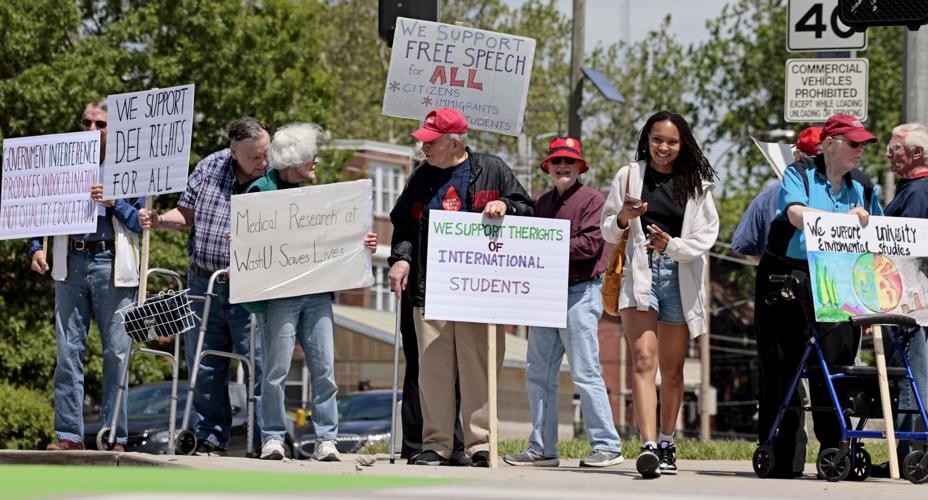
A Washington University student passes about 15 residents of Laclede Groves senior living community in Webster Groves, who were protesting near the campus in ėŻ╠ę╩ėŲĄ on Thursday, May 8, 2025, in support of international students, science and medical research, DEI initiatives, gender equality, free speech and against policies they associate with an anti-democracy movement in the United States.
ST. LOUIS ŌĆö Philip Blackwell emailed me with a correction.
He had read my recent column criticizing the Trump administration for targeting foreign college students for deportation, but he had an issue with me suggesting that Generation Z ŌĆö my sonŌĆÖs age group ŌĆö would be the ones to win this battle.
Blackwell wanted me to know that his generation ŌĆö the so-called Silent Generation born between the Greatest Generation and Boomers ŌĆö has not yet given up the fight.

Steve Weissman, a resident of┬ĀLaclede Groves senior living community in Webster Groves, protests with about 15 others outside the Washington University campus in ėŻ╠ę╩ėŲĄ on Thursday, May 8, 2025, in support of international students, science and medical research, DEI initiatives, gender equality, free speech and against policies they associate with an anti-democracy movement in the United States.
True to his word, Blackwell, and more than a dozen of his friends, all in their 80s and 90s, were demonstrating at the intersection of Skinker Boulevard and Forest Park Parkway on Thursday, standing up against the current administrationŌĆÖs attacks on higher education. They held signs that said, ŌĆ£Medical Research Saves Lives,ŌĆØ and ŌĆ£We Support the Rights of International Students,ŌĆØ and ŌĆ£We Support Free Speech for All.ŌĆØ
People are also reading…
They stood among students who were passing by and stopped for a chat; and they welcomed the honks of vehicles as they drove by.
ŌĆ£We decided we needed to act,ŌĆØ said Steve Weissman, who, like Blackwell, is a retired minister. Weissman, 85, is an Episcopal priest; Blackwell, 81, is a United Methodist pastor. Both retired, they met at the Laclede Groves retirement community in Webster Groves, where they live. Over coffee, the two of them decided this moment in history demanded action from those who could muster the energy. Seniors for Democracy was born.
ItŌĆÖs grown into a group of more than 60 senior citizens on an email chain, with weekly meetings to discuss the goings-on in the world as the Trump administration tramples the U.S. Constitution and attacks institutions like American universities.

Residents of┬ĀLaclede Groves senior living community in Webster Groves protest outside the Washington University campus in ėŻ╠ę╩ėŲĄ on Thursday, May 8, 2025, in support of international students, science and medical research, DEI initiatives, gender equality, free speech and against policies they associate with an anti-democracy movement in the United States.
About a year and a half ago, Blackwell had congestive heart failure. His treatment over three days in a hospital reminded him how important medical research is. ŌĆ£So, when the current administration said that they were going to cut funds for medical research I knew what my sign would say,ŌĆØ Blackwell said. ŌĆ£Medical Research Saved My Life,ŌĆØ read the sign he held high at the protest. ŌĆ£It is a message not just in support of WashU, but I know a few people in the field there who are impacted by the threat.ŌĆØ
Indeed, Washington University is among the top research institutions in the country at risk of losing National Institutes of Health funding in the Trump cuts, putting at risk cancer research, AlzheimerŌĆÖs cures, and so many other projects in the medical field. On top of that, the university regularly recruits international students in the research fields, and top researchers from around the world, who might think twice before coming to the U.S. when they have other, more welcoming options.
ŌĆ£WeŌĆÖve got to get the word out,ŌĆØ said Jim Owens, 88. ŌĆ£WeŌĆÖve got to make sure we save Social Security.ŌĆØ
Next to Owens was Harold Maness, a 98-year-old World War II veteran who served in the Army infantry. ŌĆ£IŌĆÖm here to support my friends,ŌĆØ he said, which seemed as good a reason as any.
Phillis Evans, 86, said this is her sixth protest since March. ŌĆ£ItŌĆÖs the most effective thing I can do right now,ŌĆØ she said.
Their small gathering for a couple of hours at a busy intersection in ėŻ╠ę╩ėŲĄ will at least serve to let some of the students at Washington University know that they are not alone in their current struggle against some of the Trump administrationŌĆÖs policies. Such protests have become common in recent months across the country, as various groups use their collective voices to draw attention to the authoritarian nature of TrumpŌĆÖs first few months in office.
For Blackwell and Weissman, the moment in time recalls, to some extent at least, the Civil Rights Movement in the Sixties. Blackwell, who grew up in Illinois and Wisconsin, was a student at Yale Divinity School when he and some of his fellow students traveled to Washington, D.C., to sing ŌĆ£Give Peace a ChanceŌĆØ at the Washington Monument, with about 500,000 others, led by Pete Seeger. Weissman, who is from Cincinnati, Ohio, marched in Selma in 1965.
So the two retired pastors are not entirely new to the concept of using their First Amendment rights to stand up for what they believe in. One thing, though, is completely different this time around.
ŌĆ£The music was better then,ŌĆØ Weissman said.
Post-Dispatch photographers capture hundreds of images each week; here's a glimpse at the week of April 27, 2025. Video edited by Jenna Jones.














